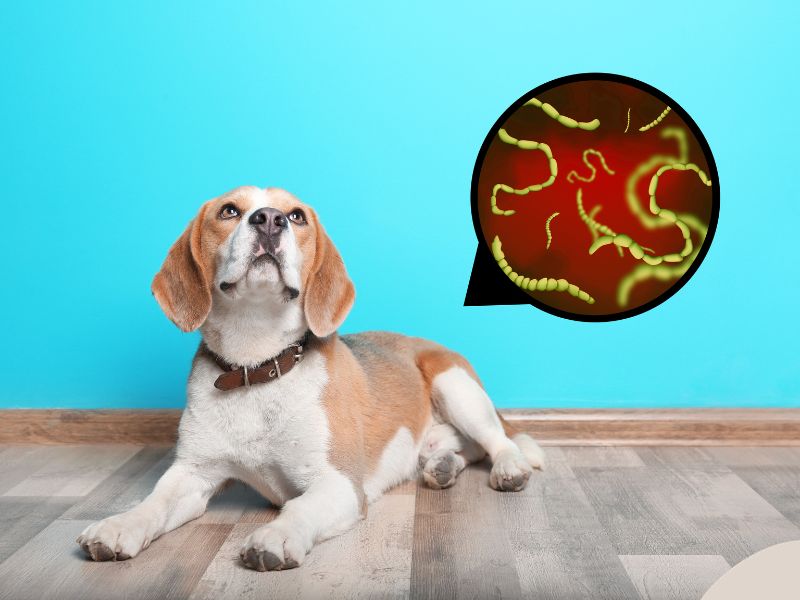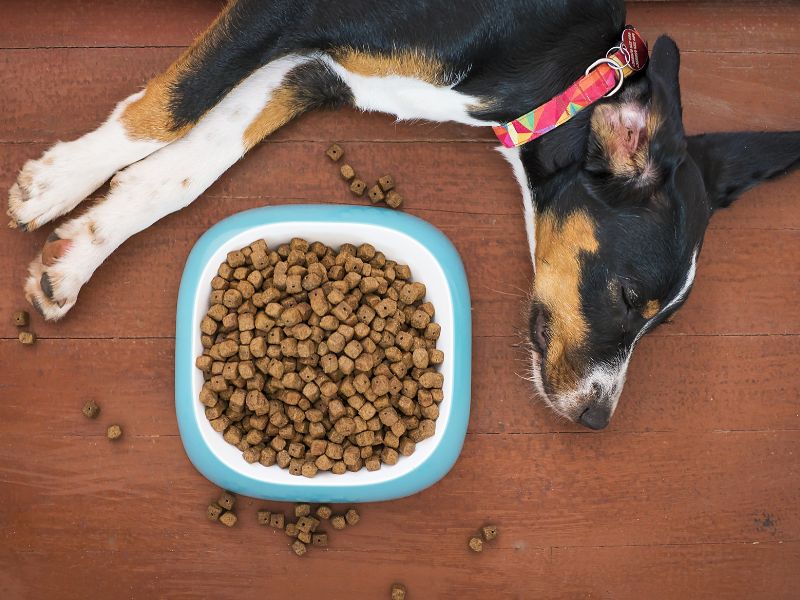For every dog parent, the health of their best friend is important. Just as with humans, a dog’s gut health is intrinsically linked to its overall well-being, and their reactions to food matter. Lots of times, it’s thought that a dog has food allergies or an intolerance, but more often, there’s a connection between a dog’s gut health and how they react to what they eat.
Gauging Your Dog’s Gut Health
Your dog’s gastrointestinal (GI) tract is more than just a food processing unit; it’s actually a pretty cool ecosystem, a nutrient absorber, and even an immune system communicator. When this detailed system gets disrupted or is thrown off balance, the signs can be more widespread than just digestive issues. Sometimes, the symptoms a dog has, as a reaction to the dog’s diet, can manifest in other ways than just the obvious.
Signs Of Poor Gut Health In Dogs:
- Digestive anomalies like loose stools or dog diarrhea, constipation, or excessive gas.
- Skin problems like itchy patches, hot spots, and frequent infections.
- Behavioral symptoms like increased lethargy, anxiety, or general grumpiness.
- A weakened immune system, evident from frequent illnesses or prolonged recovery periods.
When a dog’s gut is out of balance, the population of beneficial bacteria dwindles, allowing harmful bacteria to dominate. This imbalance can lead to a weakened gut lining, reduced nutrient absorption, and heightened disease vulnerability.
The Canine Microbiome: Characteristics of a Healthy Gut
 The microbiome is a complex community of microorganisms, including bacteria, fungi, protozoa, and viruses, that reside in various body parts, mostly found in the intestines. For dogs, just as with humans, the health and diversity of these microbial populations play a vital role in overall well-being. Understanding what constitutes a healthy dog microbiome provides valuable insights into canine health and nutrition. So what makes a healthy dog gut?
The microbiome is a complex community of microorganisms, including bacteria, fungi, protozoa, and viruses, that reside in various body parts, mostly found in the intestines. For dogs, just as with humans, the health and diversity of these microbial populations play a vital role in overall well-being. Understanding what constitutes a healthy dog microbiome provides valuable insights into canine health and nutrition. So what makes a healthy dog gut?
- Diversity. A robust canine microbiome is marked by its diversity. A wide variety of bacterial species indicates a healthy gut. This diversity ensures that different bacteria can perform multiple functions, from digesting various food components to producing essential vitamins and neurotransmitters. Studies have shown that a decrease in microbial diversity is often associated with health disorders, both gastrointestinal and systemic. Some of these include:
- Beneficial Bacteria Dominate. While the gut hosts both beneficial and potentially harmful bacteria, a healthy dog microbiome is characterized by a predominance of the beneficial ones. Some of the essential bacterial groups in a healthy canine gut include:
- Firmicutes: Firmicutes are a foundational group of bacteria in a dog’s gut and a big contributor to your dog’s health. They play diverse roles in digestion, energy extraction, and overall health and well-being. Research continues to teach us more about these bacteria and how they are involved in energy extraction and help digest complex carbohydrates.
- Bacteroidetes: These play roles in breaking down proteins and carbohydrates.
- Actinobacteria: Some species, like Bifidobacteria, ferment dietary fiber and produce short-chain fatty acids that are beneficial to gut health.
- Proteobacteria: While sometimes this may include some potential pathogens, in a balanced gut, their beneficial members contribute to overall health.
- Beneficial Bacteria Dominate. While the gut hosts both beneficial and potentially harmful bacteria, a healthy dog microbiome is characterized by a predominance of the beneficial ones. Some of the essential bacterial groups in a healthy canine gut include:
- Stable Yet Adaptable. A healthy microbiome maintains its core structure even with minor changes in your dog’s diet. However, it should also be adaptable. For example, if a dog’s diet shifts from one protein source to another, the microbiome should adjust to optimize digestion of the new protein in the dog food without causing significant digestive upset. Concern about this is why vets always recommend slowly introducing a new dog food–not every dog’s digestive tract is healthy enough to adjust without much issue.
- Production of Beneficial Compounds. The bacteria in a healthy dog gut actively produce compounds that benefit their host, your best buddy. This includes:
- Short-Chain Fatty Acids (SCFAs): Particularly butyrate, propionate, and acetate. These are crucial for colon health, serve as energy sources for the body, and have anti-inflammatory properties.
- Vitamins: Certain B vitamins and vitamin K are synthesized by gut bacteria.
- Neurotransmitters: Some gut bacteria can produce neurotransmitters, and this is what can affect the dog’s mood and behavior. Science continues to find new information about this every day!
- Strong Barrier Function. The microbiome plays a pivotal role in maintaining the integrity of your dog’s gut lining. A healthy microbiome means the gut barrier is strong and protective, preventing a “leaky gut.” This condition, where undigested food particles and bacteria can pass through the gut lining into the bloodstream, can lead to inflammation and various health issues. This is what dogs often suffer from when it’s assumed it’s food allergies or food intolerances.
- Symbiotic Relationship with the Host. The microbiome and the dog should exist in harmony. In a healthy state, the microbiome benefits from the nutrients the dog consumes, and in return, it helps in digestion, nutrient absorption, and immune system regulation. This is what helps the overall health and well-being of your dog.
Decoding Food Sensitivities In Dogs: Allergy, Intolerance, or Sensitivity?
Understanding the difference between food intolerance, sensitivity, and allergy is crucial because there is often so much overlap. A dog’s digestive system is at the core of all of them, but knowing whether you’re dealing with food intolerances, allergies, or sensitivities may affect how you manage symptoms. The truth is, though, managing and maintaining the best dog gut health you can, can not only help the dog’s health overall but may help in all the symptoms, regardless of the condition.
- Food Intolerance: This is a digestive response where the dog might lack certain enzymes to process specific food components, such as lactose, resulting in symptoms like bloating or diarrhea.
- Food Sensitivity: This broader category covers any adverse reactions to food, either from intolerance or allergy. These reactions might develop gradually, and that makes them trickier to identify because they can seem sudden when there weren’t issues before.
- Food Allergy: This is an immune response. When dogs consume food they’re allergic to, their immune system mistakenly sees it as a threat, triggering reactions ranging from itchy skin and hot spots to allergic reactions in their lungs to gastrointestinal signs and issues.
With a strong, healthy gut, the chances of developing any of these food reactions reduce considerably. A strong, fortified gut lining prevents undigested food particles from entering the bloodstream, which is a potential cause for sensitivities.
Grain-Free Dog Food: A Balanced Perspective To Help?
While grain-free dog foods have gained popularity due to the belief they more closely resemble the natural diet of wild canines, it’s essential to understand the pros and cons. Some dogs may indeed be sensitive to certain grains, making grain-free options beneficial. However, not all grains are problematic. In fact, grains like rice or barley can be nutritious and easily digestible. Additionally, some research suggests a link between grain-free diets and specific heart conditions in dogs, underscoring the need for careful consideration and veterinary consultation. More and more, as we learn that it’s the dog’s health in the gut that may be causing adverse food reactions rather than the dog’s food, so to speak, vets are focused on ensuring a dog’s immune system and gut are healthy first before recommending no grains.
Distinguishing Food Intolerances from Allergies
The key to differentiating an allergy from an intolerance lies in observing symptoms and their onset. Allergic reactions typically happen right after food consumption and primarily involve the dog’s immune system. Intolerances, however, are slower to manifest and predominantly involve the digestive system and your pet’s immune system.
Enhancing Gut Health To Reduce Food Allergies and Food Intolerances In Dogs
Basically, prioritizing your dog’s gut health can be a preventive strategy against food allergies, sensitivities, and intolerances. It’s a holistic approach to ensuring our four-legged friends lead vibrant, healthy lives because it doesn’t just focus on the symptoms of those conditions, but their overall health and well-being. Adding premium fibers and probiotics makes a huge difference, as does adding prebiotics like XOS (xylooligosaccharides). As a prebiotic, XOS acts as food for beneficial bacteria. By fostering a thriving community of good bacteria, XOS helps strengthen the gut lining, mitigate inflammation, and promote overall gut health.
And that’s why we created Bernie’s Perfect Poop. We combined all those ingredients and digestive enzymes for our dogs’ best health and vitality and we’ve never looked back!


